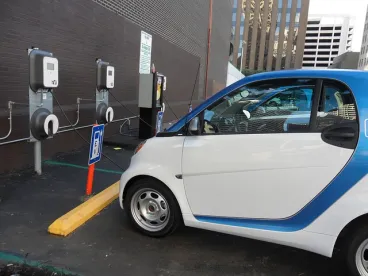The Miami-Dade County Board of County Commissioners recently adopted an ordinance establishing off-street parking requirements for electric vehicles (EVs) which mandates minimum EV parking spaces in all new uses with limited exceptions provided below. The ordinance defines the terms pertaining to EV infrastructure, such as EV Supply Equipment (EVSE), EVSE Space, and EVSE-Ready Space and establishes penalties for misuse of parking spaces designated for EV charging.
The ordinance establishes two sets of criteria. One set to be used prior to January 1, 2022, and another to be used after January 1, 2022, when it is anticipated that most automakers will have switched to predominantly EV production lines thus the number of EVs is expected to increase considerably. In particular, the ordinance recognizes that automakers are investing over $90 billion in the development of electric and hybrid models and that General Motors specifically announced an all-electric path to zero emissions with the introduction of at least 20 new EVs to launch by 2023.
Pursuant to the ordinance, parking spaces specifically designed for charging of EVs will be required for all new uses other than single-family, duplex, townhouse, and properties with a current certificate of use or occupancy for a church or religious use. The number of required EVSE/EVSE-Ready Spaces will be based on the total number of required off-street parking spaces and will count toward off-street parking requirements. For example, where 10 or more off-street parking spaces are required, a minimum of 10% of those required parking spaces must be EVSE-Ready prior to January 1, 2022, and a minimum of 20% must be EVSE-Ready on or after January 1, 2022. The ordinance also permits the EVSE operator to charge a fee for EV charging and requires that all EV parking spaces be prominently designated with permanent above-ground signs.
The ordinance represents the first step at the level of Miami-Dade County toward addressing the growing number of EVs by requiring the installation of the infrastructure needed to enable future EV charging stations. Requiring EV infrastructure may increase the cost of construction and may undermine other incentives aimed at increasing the affordability of housing stock. As the County receives feedback on EV spaces, perhaps exceptions can be made for projects that include an affordable or workforce housing component. One thing is for certain, developers will no longer have the option to decide whether to include EV parking and will therefore need to include it in the budget for future real estate projects.





 />i
/>i
